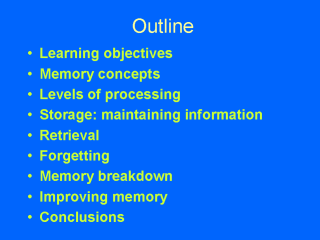| front |1 |2 |3 |4 |5 |6 |7 |8 |9 |10 |11 |12 |13 |review |
 |
Ah yes! The outline. When
doctors give information to patients (or other people for that matter) there is a tendency
to do so in a disorganized and prosaic form - a long, oratory of information, which has
been called amorphous rambling. The doctor might understand what s/he is trying to say,
but chances are, the patient will not remember much at all. Why? Because to be retained,
information must have meaning -paradoxically, not having any meaning can be meaningful,
but it is only an amorphous meaningfulness that does not allow you to retain much detail
(because you cannot differentiate detail if it has no meaning). Organization is a means of giving meaning by classifying information in many different ways. The process of classification makes the classifier an encoding aid and a subsequent prompt to recall. So this lecture will use a number of cognitive strategies to aid recall. The first of these is called Explicit categorization: Say this term out loud to your self several times - think about what it means - explicit: distinctly stated, clear; categorization: the process of putting into categories. In the slide above, there are a list of categories by which this lecture has been organized: you can remember them by creating a mnemonic - a word or phrase that cues a key letter of each category, such as: Only Cats Perform Stunts Right For My Ideal Concert. This one works for me, but something else might have more meaning for you. Try to think of another one. |